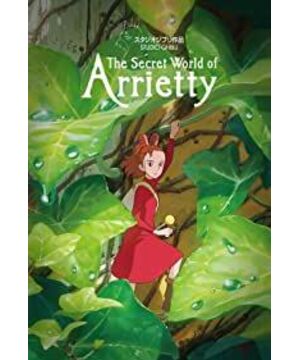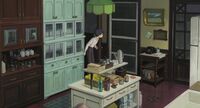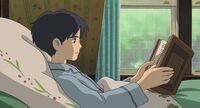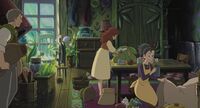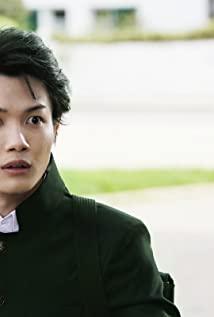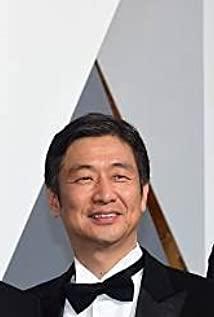After watching "Arrietty the Borrower", I feel warm inside, and at the same time a little sad. A good movie can always do this - it makes people think, and makes people immersed in it for a long time and can't extricate themselves. First of all, the story in the film is very exciting and fantastic, so it can catch the audience's attention from the beginning, and then the development of the storyline also conforms to the audience's wishes, but the ending is beyond everyone's expectations, making the whole film focus on warmth With some sentimentality and sadness, what is the purpose of Mr. Hayao Miyazaki, who is the screenwriter of the film, making this arrangement? From the intricate details and the revelation of the foreshadowing in the film, it is not difficult to see Gong Lao's good intentions. Let's interpret this film in detail below!  "Arrietty the Borrower" is adapted from the late British children's writer Mary Norton's masterpiece "The Underground Villain" published in 1953. A story of a little boy who met. In this animation, Hayao Miyazaki took the title of supervision and handed over the guide rod to the newcomer Mirin Hongchang, who was a painter, and he only served as the screenwriter. When Gong Lao wrote the script, he did not reread "The Little Man under the Floor", but wrote it based on his impressions 40 years ago. When he himself is making animations, he often contemplates the plot while drawing. At first, he is not sure about the ending. However, because he is cooperating with juniors this time, he first completed the script, and then director Milin did the storytelling, and then entered the painting stage. . Although Hayao Miyazaki has taken a back seat this time, the film still continues the quiet and beautiful characteristics of Hayao Miyazaki's animation. Clean picture, perfect soundtrack, bizarre and beautiful story, simple but slightly sad emotional line, "The Villain Arrietty Who Borrowed Something" has added a wonderful touch to Studio Ghibli. Hayao Miyazaki once said: For this work, he did not make a sound, but only came forward to see it. Who knows, it can be said that his "nature is hard to change". The day after he finished speaking, he went to the work site and said : "It can't be like this here", and then he drew a sketch on the whiteboard, causing the scene to fall into chaos for a while. From this point of view, the leading character in the production of this film is still Gong Lao, so it is not an exaggeration that the film was officially released on July 17, 2010 with the name of Hayao Miyazaki, and finally the film earned 96. The domestic box office of 500 million yen ranked first in the box office of Japanese domestic works that year. At the beginning of the film, the male protagonist Xiang and his aunt appear on the stage. The sad-faced teenager is accompanied by a slightly weak body. I don’t know how many young viewers feel sorry for them. A small red car blocked the road when they approached the house. The mother-in-law said casually as if complaining: "A-Chun is causing trouble again." This sentence led to the possibility that A-Chun would continue to do unpleasant things, and then Zai Xiang waited for his aunt to solve the problem. When the heroine quietly appeared, Arrietty, who was not as tall as a laurel leaf, was found by Xiang, although she was cautiously hiding behind the leaf stem. However, Arrietty did not know that she had been exposed in front of human beings. When the heroine escaped the pursuit of the cat and the interruption of the crickets, she was found by her mother when she returned to her bedroom. The mother, who was a little angry and worried, burst into laughter when she saw the laurel leaves that Arrietty brought back for her birthday. Speaking of which, it only took five minutes for the film to clearly imply the character of each protagonist, and I believe the audience also noticed it. Xiang is a taciturn but careful and frail boy, and Arrietty is a lively, optimistic, A filial and assertive little warrior, Eddie's mother is a fragile but materialistic housewife. Although Ah Chun has not shown up, she can be judged to be an eventful and annoying maid. As a leader in the animation film industry, Mr. Hayao Miyazaki's roles range from the original artist to the director to the producer and screenwriter. , then it's time for a question. Sure enough, Arrietty's mother mentioned that "if you have sugar, you can make delicious shiso juice", so our little warrior came up with the idea of what she wants to borrow at night. Seeing this, we began to be puzzled. What is "borrowing things"? Do dwarves and humans have a contract? When the dwarfs are short of daily necessities, they can borrow them from humans? Then why does it have to be at night and wait for the human to fall asleep before borrowing? As the camera went on, the answer was soon revealed. We saw the heroine and her father overcome all obstacles and use their bravery and wisdom to sneak into the huge kitchen in their eyes. At this time, I believe everyone understands, these two It's clearly stealing something, and it has to be called "borrowing something". Then they successfully "borrowed" the sugar. The sugar that they got after all the hard work is so insignificant in the human world. It is much less than the food we waste every day. As a human being, I began to sympathize with the little one. Dwarves, working so hard for a living to maintain a difficult existence, if they are not helpless, they will not Steal it! Since they have to steal as a last resort, and they have to steal with peace of mind, they can only deceive themselves and call stealing a borrowing. Gong Lao gave dwarves and humans the same worldview. They have the same language and writing as humans. They also have a sense of shame, and they are indeed greedy for enjoyment. If it wasn't for Arrietty's mother who still wanted tissues, this man wouldn't. It will be discovered, and it will not be so nervous that the sugar that has been obtained will fall out. Of course, it would be nice if it was as simple as losing the sugar, the key is that they were discovered by humans! This indicates that they may face extinction! They have to figure out a way to move as quickly as possible. Do humans really hate dwarfs that much? In fact, Xiang's family is very wealthy. Giving alms to the dwarfs is really a drop in the bucket, and their original intention is to live in peace with the dwarves and share daily necessities. From the doll house that Xiang's great-grandfather customized for the dwarfs It can be seen, but the servant A Chun sees the dwarf as a mouse that steals things, and wants to get rid of it quickly. She has no tolerance and love at all, and even secretly caught Arrietty's mother and almost gave her away. In the research institute, Xiang finally learned of A Chun's conspiracy and helped Arrietty rescue her mother. The dwarf's life has gone through twists and turns, and the story is nearing the end. It can be seen that Xiang likes Arrietty and wants to protect her. We guess the result from normal thinking. Since A-Chun is Xiang's servant, can Xiang be open and aboveboard? Stop A-Chun from continuing to hurt the Arrietty family, and let the Arrietty family move into the doll house to live a happy and stable life, but the ending is not like this! From arranging Spiller's appearance, it was destined that the ending would not be so natural. This dark dwarf rescued Arrietty's father and told the Arrietty family that they still have the same kind of existence. The most crucial information he brought was that he He is not a "borrowing" family, he makes a living by hunting, and he does not have to live a life under others' fences. This important foreshadowing made an important foreshadowing for the Arrietty family to move away later. Although the future was uncertain, although they had to give up their beautiful home, they left here resolutely. Mr. Miyazaki's unique creativity gives this story a unique worldview. He raised the theme of the film to a very high philosophical level. In fact, humans are no different from the dwarfs of the "borrowing things" family. Don't we also borrow things constantly like nature? If we don't borrow it, we can't live, but since we borrowed something, how should we repay it? This is worth thinking about. The story of the film gives the answer. I still remember Arrietty's parting with Xiang before she left. It was sad and touching. Xiang said, "You inspired me to survive". to have surgery ), gave her that piece of sugar cube that was very important to Arrietty's family, and Arrietty also left the hairpin on her head to Xiang, and hugged Xiang's index finger reluctantly, and the tears flowed into a river. Word by word to express the sustenance in my heart: "I am very glad to have your protection, and I will be healthy in the future." The dwarfs borrowed things from humans and they repaid them with courage, love, heart, and gratitude. What about humans? How do we pay our debts?
View more about The Secret World of Arrietty reviews


